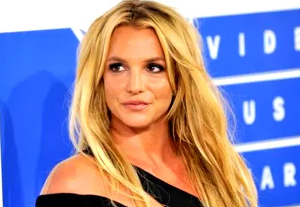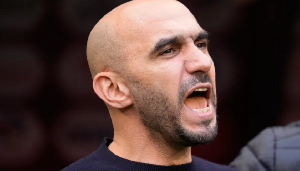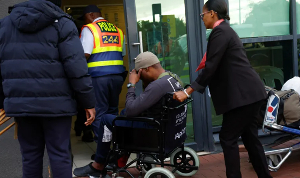Africa is in the news for a couple of bad reasons, as often.
First, Egypt's parliamentary elections have been blighted by allegations of wide
spread rigging in favour of Hosni Mubarak’s incumbent government, to the detriment
of the opposition.
Second, and more widely publicised, Cote d'Ivoire's Laurent Gbagbo has refused to
stand down as President, despite the Electoral Commission’s pronouncement that
opposition candidate, Alassane Ouattara has won the presidential elections.
The verdict of Cote d'Ivoire's Electoral Commission has been backed not only by the
United Nations, but also by credible, accredited electoral observers, leaving
President Gbagbo with no basis to reject the results. His refusal to accept,
however, means Cote d’Ivoire is in danger of slipping back into civil war.
As Ghanaians, the events in Cote d'Ivoire must spur us into appreciating our
superiority to most African countries with regard to democracy.
Though Ghana, with a Gross Domestic Product (GDP) of GH¢44.8 billion is relatively
poor, the country, is internationally regarded as an epitome of democracy and good
governance.
This has consistently been affirmed by individuals and organisations of impeccable
repute. The latest high profile individual to applaud Ghana's democracy is United
States (US) President, Barrack Hussein Obama.
In his speech delivered to Ghana's Parliament in 2009, Obama stated that 'the people
of Ghana have worked hard to put democracy on a firmer footing, with repeated
peaceful transfer of power, even in closely contested elections''. And this explains
why Obama visited Ghana in 2009.
Some have suggested that Obama came to Ghana to secure Ghana's oil resource. Others
have said that Obama was in Ghana to set up the headquarters of the Africa Command
of the US military (Africom). However, these views are probably misplaced due to the
following reasons:
First, if Obama wanted oil, he could have gone to Nigeria which has 30 times more
oil than Ghana, or to Angola or Libya which possesses billions of barrels of proven
oil reserves. Also, countries such as Gabon and The Sudan possess greater quantities
of oil than Ghana.
Second, America does not need Ghana to host Africom because Germany already does that.
Obama's visit to Ghana was a gesture aimed at encouraging Ghana and other democratic
countries, to entrench democracy, good governance, and fairness in elections. The
visit symbolises America's resolve to support democratic countries such as Ghana and
ostracise countries that perpetually subvert the democratic process and the will of
the people.
Ghana's democracy is today an example to many countries in the African sub-region,
because certain individuals, at various times, put the interest of the country ahead
of their personal interests.
Two of such individuals are Presidents Jerry Rawlings and John Agyekum Kufuor.
Mr Rawlings, especially, deserves special commendation for the giant step he took in
restoring Ghana's democracy, after many years of military rule. At the time he
decided to reposition Ghana on the path of democracy, there was absolutely no
motivation to do so because many African countries were still under military rule.
In Nigeria, General Ibrahim Babangida was fully in charge . In Libya, Muammar al
Qaddafi had not given up his hold on power.The same situation existed in countries
such as Guinea, DR Congo and so on.
Essentially, Rawlings' decision to restore the right of Ghanaians to multi-party
democracy (no matter how painful it must have been), is an invaluable achievement
that deserves the commendation of all , irrespective of our political leaning.
This is,especially in view of the fact that Rawlings, like Omar Bongo, Lasana Conte,
and Togo’s Eyadema, could have ignored pressure from home and abroad and remained in
power till today.
By opting for constitutional democracy, Rawlings was limiting himself to a maximum
eight years in power; yet he went ahead to lift the ban on political parties, a
situation which paved the way for the 1992 general elections,which he won.
In 2000, when Rawlings’ mandatory eight years ended, many feared he would either
seek a third term in office, or refuse to step down as President. However, not only
did Rawlings supervise free and fair elections, he also went ahead to honourably
hand power to opposition leader, Mr J.A. Kufuor, who won that election. This,
remarkably, marked Ghana’s first peaceful transfer of power from an incumbent
government to the opposition.
Aside his exemplary leadership, President J.A. Kufuor did a lot to consolidate
Ghana’s democracy. Unlike Nigeria’s Olusegun Obasanjo, Kufuor did not attempt to
seek a third term after his second term ended in 2008.
More important, he oversaw a free and fair election that saw him hand over power to
the leader of the opposition NDC, Professor J.E.A. Mills, who won the 2008 election
by a slim margin. This marked Ghana’s second peaceful transfer of power from an
incumbent government to the opposition.
The foregoing, needless to say, are great achievements, especially when one
considers the injustice and violence that perpetually characterise most elections on
the African continent. It is either the elections aren’t free and fair, leading to
subversion of the will of the people, or incumbent governments blatantly refuse to
step down even when they lose glaringly to the opposition.
We saw this in Nigeria, in 2007, where President Olusegun unilaterally imposed a
relatively unknown Yar’ Adua on Nigerians, in an election characterised by
irregularities and election malpractices. This was after Obasanjo had failed in his
bid to seek a third term in office.
We saw this in Kenya, where the 2008 election was characterised by extreme violence
which led to the death of over 1000 people and the displacement of over 200,000
people, after opposition leader Raila Odinga alleged electoral manipulation and
refused to accept the verdict of the Kenyan Electoral Commission that gave victory
to incumbent President, Mwai Kibaki.
We saw the violence that erupted during Guinea’s disputed presidential elections in
November.
In many other African countries, elections are either not held at all, or fixed in
favour of incumbent governments.
The situation in Ghana, is however different and former Presidents Rawlings and
Kufuor deserve the greatest of credit for their contribution to the promotion of
democracy in this country. During their respective stints in office, they ensured
that elections were held freely and fairly and respected the will of the Ghanian
electorate on every such occasion.
U.S. President, Barrack Obama, told Ghana's Parliament that ''time and again,
Ghanaians have chosen constitutional rule over autocracy, and shown a democratic
spirit that allows the energy of your people to breakthrough''.
Then he went on to add, "We see that in leaders who accept defeat graciously”.
These are some of the endorsements that have distinguished Ghana from most
countries on the African continent.
Apart from the distinguished efforts leaders such as Jerry John Rawlings and John
Agyekum Kufuor made to put the democracy of the country in this firm position, we
ought to recognise also, the extraordinary contributions of institutions such as the
media, Parliament, the security forces and the courts to the growth of Ghana's
democracy.
The peace-loving people also deserve a pat on the back for continuously embracing
democracy. This, however, is not the time to be complacent.
With the 2012 general elections fast approaching, it is our responsibility as
individuals and institutions to play our respective parts in consolidating the
democracy and good governance that have made Ghana the ‘shining star’ of Africa.
Samuel K. Obour samuelkwason@yahoo.com
Opinions of Sunday, 23 January 2011
Columnist: Obour, Samuel K.
Ghana-A shining example of democracy in Africa
Entertainment













